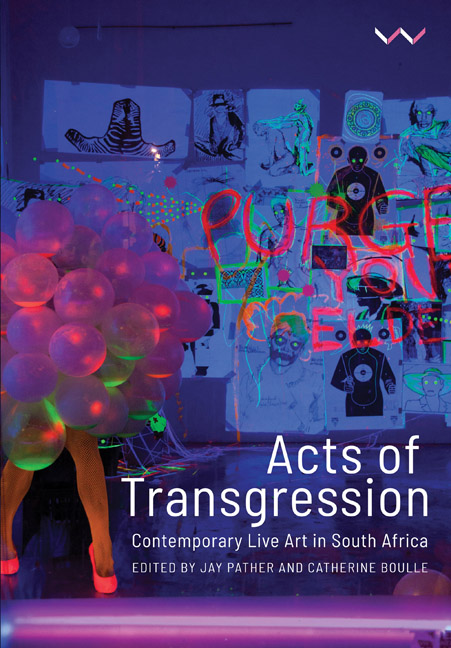Book contents
- Frontmatter
- Contents
- Acknowledgements
- Introduction
- PART ONE LIVE ART IN A TIME OF CRISIS
- PART TWO LOSS, LANGUAGE AND EMBODIMENT
- 5 Corporeal HerStories: Navigating Meaning in Chuma Sopotela's Inkukhu Ibeke Iqanda through the Artist's Words
- 6 ‘A Different Kind of Inhabitance’: Invocation and the Politics of Mourning in Performance Work by Tracey Rose and Donna Kukama
- 7 State of Emergency: Inkulumo-Mpendulwano (Dialogue) of Emergent Art When Ukukhuluma (Talking) is Not Enough
- 8 Space is the Place and Place is Time: Refiguring the Black Female Body as a Political Site in Performance
- PART THREE RETHINKING THE ARCHIVE, REINTERPRETING GESTURE
- PART FOUR SUPPRESSED HISTORIES AND SPECULATIVE FUTURES
- Contributors
- List of Illustrations
- Index
8 - Space is the Place and Place is Time: Refiguring the Black Female Body as a Political Site in Performance
from PART TWO - LOSS, LANGUAGE AND EMBODIMENT
Published online by Cambridge University Press: 30 May 2019
- Frontmatter
- Contents
- Acknowledgements
- Introduction
- PART ONE LIVE ART IN A TIME OF CRISIS
- PART TWO LOSS, LANGUAGE AND EMBODIMENT
- 5 Corporeal HerStories: Navigating Meaning in Chuma Sopotela's Inkukhu Ibeke Iqanda through the Artist's Words
- 6 ‘A Different Kind of Inhabitance’: Invocation and the Politics of Mourning in Performance Work by Tracey Rose and Donna Kukama
- 7 State of Emergency: Inkulumo-Mpendulwano (Dialogue) of Emergent Art When Ukukhuluma (Talking) is Not Enough
- 8 Space is the Place and Place is Time: Refiguring the Black Female Body as a Political Site in Performance
- PART THREE RETHINKING THE ARCHIVE, REINTERPRETING GESTURE
- PART FOUR SUPPRESSED HISTORIES AND SPECULATIVE FUTURES
- Contributors
- List of Illustrations
- Index
Summary
This chapter explores the idea of black visuality as located within the Rhodes Must Fall (RMF) and Fees Must Fall (FMF) movements of 2015 and 2016. Both movements were driven by student-led protest actions that took place across South African universities, calling not only for the fall of colonial symbols, such as the Cecil John Rhodes statue on the University of Cape Town (UCT) campus, but, more broadly, for free, quality, decolonised education. Previously, many historically disadvantaged universities protested for free education, but the 2015 and 2016 student protests were significant because, for the first time, this call manifested across the country's major institutions of higher education. In both movements it became clear that the students most affected were black students from previously disadvantaged homes as well as middle-class backgrounds. It also became evident that these students faced being excluded on the basis of race and class, and later, as the protests evolved, on the basis of gender. In an attempt to interrogate the manner in which these intersecting issues were rendered either visible or invisible, I employ what African American visual culture scholar Nicole Fleetwood describes as ‘being moved by black visuality.’
The notion of black visibility is discussed here in relation to the black female body and its significance as a political site that underscores what Fleetwood sees as ‘a clear and visceral moment of being moved by black visuality.’ In this chapter, black visuality is interrogated through the lens of ‘performativity’ – a term used in this context to refer to instances or interventions that push beyond and start to disassemble organised or structured performance pieces. I am interested in the way in which black women's bodies, in particular, acquire political agency in such interventions. Black visuality is, however, used cautiously in order to explore why it may be a problematic and dangerously over-generalised concept. One of these cautions is the use of the word ‘black’ as a loosely descriptive term to refer to a particular grouping of people. The word has come to encompass many different meanings for different people who identify as black.
- Type
- Chapter
- Information
- Acts of TransgressionContemporary Live Art in South Africa, pp. 169 - 190Publisher: Wits University PressPrint publication year: 2019



